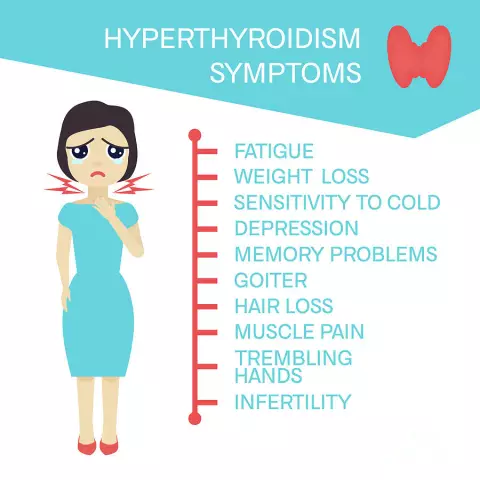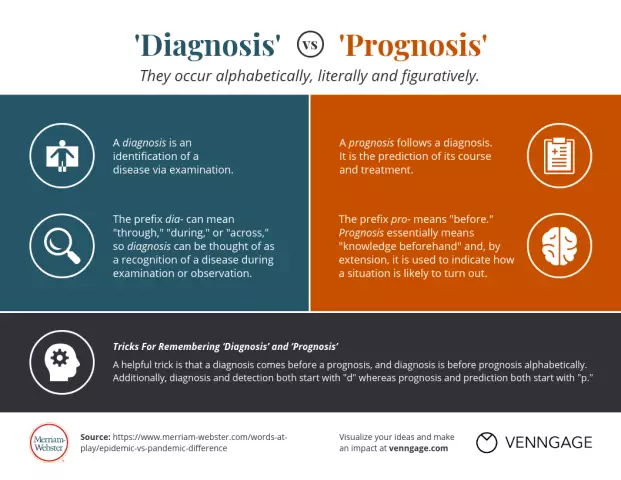- Author Rachel Wainwright wainwright@abchealthonline.com.
- Public 2023-12-15 07:39.
- Last modified 2025-11-02 20:14.
Hyperthyroidism
Hyperthyroidism (thyrotoxicosis) is an endocrine syndrome (clinical condition) caused by an overly active production of thyroid hormones thyroxine (T3) and triiodothyronine (T4) by the thyroid gland. The hormones produced by the thyroid gland are the main coordinators of the body and regulate heat consumption and oxygen production. The blood, oversaturated with hormones, carries them to all organs, tissues and systems, causing the acceleration of processes.

Hyperthyroidism is usually the result of various pathologies of the thyroid gland, which can be caused both by disorders in the gland itself, and in the processes that it regulates. According to the level of thyroid dysfunction, hyperthyroidism is primary (thyroid pathology), secondary (pituitary pathology), and tertiary (hypothalamic pathology).
People with autoimmune pathology, genetic predisposition and young women are most often affected by hyperthyroidism.
Hyperthyroidism symptoms
The symptoms of hyperthyroidism are caused by the acceleration of all processes in the body and are manifested by the increased work of human systems and organs. The manifestation of symptoms of hyperthyroidism depends on the severity and duration of the disease, as well as on the degree of damage to organs, systems or tissues. An excess of hormones produced by the thyroid gland affects the human body as follows:
- Central nervous system. Increased excitability, emotional instability, irritability, causeless anxiety, fear, fast speech, sleep disturbances, hand tremors;
- The cardiovascular system. Cardiac arrhythmias - hard-to-treat persistent sinus tachycardia, atrial fibrillation, and atrial flutter. An increase in the gap between the values of the upper and lower pressure readings due to an increase in systolic and a simultaneous decrease in diastolic blood pressure. Increased heart rate, increased volumetric and linear blood circulation. Heart failure;
- Ophthalmology. An increase in the palpebral fissure, forward displacement, protrusion of the eyeball with a restriction of its mobility - exophthalmos. Rare blinking, bifurcation of objects, swelling of the eyelids. There is increased dryness of the eyes, corneal erosion, pain in the eyes, lacrimation. The result of compression and dystrophy of the optic nerve can be a complete loss of vision;
- The gastrointestinal tract. Increase or decrease in appetite, in elderly patients - to complete refusal of food. Disorders of digestion and bile formation, paroxysmal abdominal pain, frequent loose stools;
- The musculoskeletal system. Thyrotoxic myopathy - muscle wasting, increased muscle fatigue, chronic weakness and trembling of the body and limbs, impaired motor activity, osteoporosis. As a result, difficulties arise with prolonged walking, especially on stairs, difficulties in carrying weights, the development of reversible thyrotoxic muscle paralysis is possible;
- Respiratory system. The vital capacity of the lungs decreases as a result of congestion and edema, persistent shortness of breath is formed;
- The genital area. Violation of the secretion of female and male gonadotropins, which may result in infertility. In men, gynecomastia develops, there is a decrease in potency, in women - disruptions in the menstrual cycle, (menstruation is irregular, painful, scanty discharge, accompanied by severe headache, general weakness to fainting);
- Metabolism. Acceleration of metabolism - weight loss despite increased appetite, development of thyrogenic diabetes, increased heat production (fever, sweating). As a result of the accelerated breakdown of cortisol - adrenal insufficiency. Enlarged liver, in severe cases of hyperthyroidism - jaundice. Intense thirst, frequent and profuse urination (polyuria) due to impaired water exchange. Thinning of the skin, hair, nails, early severe gray hair, swelling of soft tissues.
Symptoms of hyperthyroidism, if present, may be absent in older people - the so-called disguised or latent hyperthyroidism. Frequent depression, lethargy, drowsiness, weakness are a typical reaction of the body of older people to an excess of thyroid hormones. Disruption of the cardiovascular system in elderly people with hyperthyroidism is observed much more often than in young people.
Hyperthyroidism signs
There are three degrees of severity of the disease, independent of the size of the thyroid gland, which are divided according to the symptoms of hyperthyroidism. Mild hyperthyroidism, signs:
- With enhanced nutrition - a decrease in body weight up to 5 kg;
- Constant tachycardia, rapid pulse 80-100 beats / min;
- Sweating, even in cool rooms;
- Irritability;
- A laboratory blood test for hormones reveals an increased level of T3, T4.
Average degree of hyperthyroidism, signs:
- With enhanced nutrition - a decrease in body weight up to 10 kg;
- Pathological changes in the myocardium, pulse rate 100-120 beats / min;
- Exophthalmos;
- Generalized hyperhidrosis (general);
- Increased irritability, excitability, anxiety, tearfulness, sleep disturbances;
- Small tremor of the fingers of an outstretched hand - thyrotoxic tremor.
Severe form of hyperthyroidism, signs:
- Drastic weight loss;
- Sustained tachycardia, pulse 120-140 beats / min and above;
- Obvious heart rhythm disorder, heart failure;
- Blood pressure - an increase in systolic pressure with a simultaneous decrease in diastolic pressure;
- Pronounced exophthalmos;
- Severe thyrotoxic tremor extending to the entire body.
The disease is diagnosed by the presence of signs of hyperthyroidism and by the results of studies.

Need to do:
- Blood test for the quantitative content of hormones;
- Ultrasound and CT scan of the thyroid gland - to determine its size and the presence of nodules;
- ECG - to determine abnormalities in the functioning of the cardiovascular system;
- Radioisotope scintigraphy - to assess the functional activity of the thyroid gland and identify nodules.
If necessary, a biopsy of the nodes is prescribed. Based on the results of the examination, the attending physician plans a treatment plan for hyperthyroidism.
Hyperthyroidism treatment
In modern medical practice, there are several treatments for hyperthyroidism:
- Medication (conservative) therapy;
- Surgical removal of the thyroid gland or part of it;
- Radioiodine therapy.
Treatments for hyperthyroidism are used alone or in combination. The endocrinologist chooses how to treat the patient, taking into account his age, the disease that caused hyperthyroidism and its severity, individual characteristics of the body and concomitant diseases. An important role both in the treatment of hyperthyroidism and in the rehabilitation period is given to diet and hydrotherapy. Once every six months, a sanatorium course of treatment for hyperthyroidism is recommended, with an emphasis on cardiovascular diseases.
YouTube video related to the article:
The information is generalized and provided for informational purposes only. At the first sign of illness, see your doctor. Self-medication is hazardous to health!






